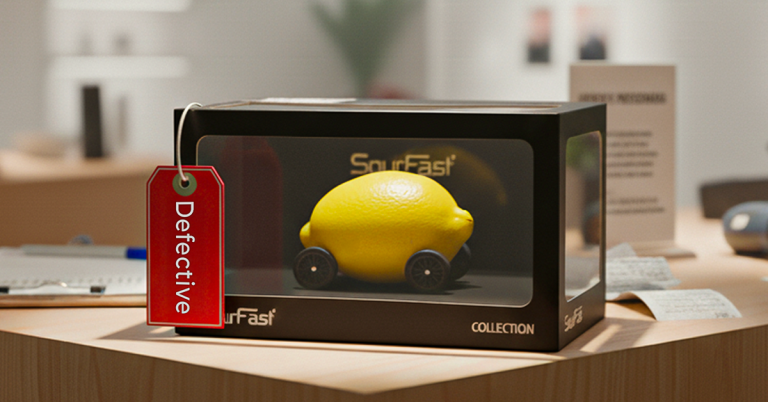The Next Time Life Gives You Lemons, You Can Choose To Return Them

Table of Contents
So, there’s been a lot of buzz around the ‘lemon law’, but what is it really? Think of it as a safety net for buyers like us. Lemon law is designed to protect consumers who end up with defective goods that just don’t work right, even after frequent repairs. This includes vehicles as well as personal items like computers, smartphones, and household appliances. Now, instead of making endless trips to the workshop and dealing with nonchalant dealers, you may be entitled to a refund or a replacement.
Don’t get the lemon law confused with insurance! Lemon law is here to protect you against defective goods, multiple repairs, replacements, or refunds, after numerous failed repairs, while insurance covers risks and damages, protecting you against financial loss after unforeseen events.
Lemon Law and the World
The lemon law isn’t something new. It was first started by the USA, followed by countries like South Korea, Philippines and Singapore (not in that order). Let’s take a look at this global lemon law comparison here:
The United States of America | South Korea | Singapore | Phillipines |
|
|---|---|---|---|---|
| What's Protected: | All 50 states have their own version of Lemon Law Most states have vehicle-specific laws but some states extend the lemon law protection to other products like appliances and electronics | Vehicles only (does not apply to vehicles for commercial purposes) | ALL new & used physical goods | ONLY Brand new motor vehicles |
| How Long You're Protected? | Between 12-24 months OR 12,000-24,000 miles, whichever comes first. California has no mileage limit, it lasts as long as the manufacturer's warranty is valid. | Within 2 years of purchase. | 6 months from delivery date. | 12 months from delivery OR 20,000 kilometers, whichever comes first. |
| Why It's Special? | California has the most unique lemon law, which covers virtually all consumer goods sold with warranties. And should they go to court, the manufacturer pays the legal fees for the prevailing consumer. | For the first 6 months, manufacturer must prove vehicle is NOT defective. Created specifically to hold major chaebols (Hyundai, Kia) accountable. | Broadest product coverage & the simplest and clearest process. | Manufacturer/Dealer gets 4 separate repair attempts for the same defect before consumer can demand replacement or refund. |
Malaysia’s Step Towards Lemon Law
For years, Malaysians have requested for enhancement in consumer protection when it comes to defective vehicles and goods. But the wait is finally over.
Prime Minister Datuk Seri Anwar Ibrahim has finally announced Malaysia’s move to implement the lemon law under the Consumer Act 1999, during the Budget 2026 speech. This marks a major step forward for our country, one that’s expected to boost consumer confidence, raise industry standards, and foster greater trust in the marketplace.
To make sense of what this means for Malaysian consumers, Farahida binti Mohamed Ridza, a corporate lawyer from a boutique law firm in Damansara Heights, shared her expertise on this new development.
“Before this, there wasn’t a clear legal process to get a refund or replacement. The lemon law ensures accountability for manufacturers and dealers, who must repair or replace faulty cars,” shared Farahida.
That’s right. The government is taking a firm stance to help consumers who are tired of being stuck with defective products and facing limited solutions. And no, you don’t need a lawyer to help make your claim.
“Once it’s in force (expected 2026), claims can likely be made through the Tribunal for Consumer Claims (TTPM). The filing fee is usually small—currently RM5 for most consumer cases. You don’t need a lawyer; it’s meant to be an easy process for consumers,” Farahida explained.
What it Means for Consumers in Malaysia
With the law set to take effect in 2026, many details are still being finalised. Malaysia’s proposed lemon law will initially focus on vehicles, but it’s part of a larger push to improve consumer protection for defective products overall.
What’s important now is for Malaysian consumers to be aware of their legal rights for defective products and how to prepare in case they ever need to make a claim. Here’s what you need to know:
-
- What evidence do I need to support a lemon law complaint?
Keep purchase agreements, warranty, and repair receipts and any complaints messages, or emails with the dealer, photo or videos showing the defect and workshop reports showing repeated attempts to repair the same problem. - Can I sue the manufacturer if the dealer refuses to help?
Yes. Under the lemon law framework, responsibility will likely extend to both the seller (dealer) and manufacturer, especially if the defect is due to production issues. You can escalate the case to the Tribunal or, in serious cases, take civil action.
- What evidence do I need to support a lemon law complaint?
What can consumers do before this law kicks into place in 2026?
Refer to existing consumer protection laws (Consumer Protection Act 1999), file complaints with the Ministry of Domestic Trade and Cost of Living (KPDN) or the tribunal if they face issues, and keep full documentation of all vehicle-related problems.
No doubt, this is going to benefit many Malaysian consumers and manufacturers alike. While we wait for the regulations to be finalised, the best we can do is to stay informed, understand our rights, and keep thorough records.
Article by Jodi Yip








